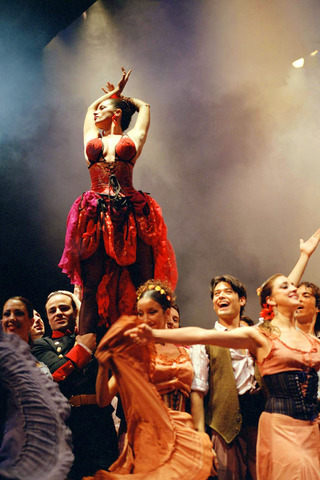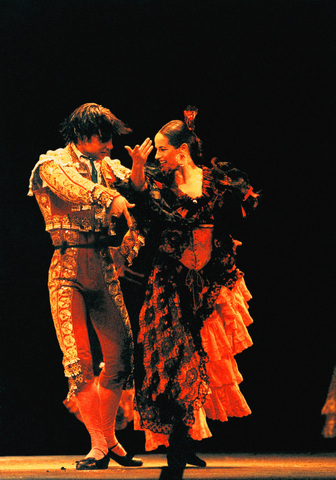The Ballet Teatro Espanol De Rafael Aguilar's tour of Taiwan did not get off to an especially good start on Sunday night. The performance began almost half an hour late and the almost capacity crowd at the Taipei International Convention Center actually started clapping around 7:50pm to urge the show to begin.
By the end of Carmen Flamenco, however, the mood in the huge theater had dramatically shifted and people were clapping, stamping their feet and yelling, "encore" (even a few "oles" were heard), through four curtain calls. Everyone, it seemed, had fallen under the sway of the wild Spanish gypsy, Carmen.
Trinidad Artiguez danced the title role when Carmen Flamenco premiered in Paris in 1992 and she gave a wonderful performance on Sunday night, switching seamlessly from bewitching siren to tough street fighter, from erotic lover to a woman who has seen repeated premonitions of her own death.

Carmen's fight with her co-worker Manolita in the cigar factory scene was a perfect mix of taunting, bragging and dueling -- only with fast-moving feet and skirts as weapons. The dancers used their colorful skirts as skillfully as the most expert fencers, twirling and tossing the material up in the air or around their bodies as they clicked around the stage with such intensity that it was hard to imagine that blood would not be drawn.
Artiguez's duets with two of her lovers, first with Don Jose -- the man who throws away his career for her -- and then with Lucas, the torero, were sizzling.
Both men, Francisco Guerrero as Don Jose, and Ivan Gongora as the matador, are fully capable of matching Artiguez's intensity. Guerrero's solo in the scene where Don Jose is imprisoned stood out for both the passion and the misery he evoked.

PHOTOS COURTESY OF KHAM
Carmen Flamenco ends with him bereft, slowly crumpling over the body of the woman he just killed.
It was interesting to see that the company's notes in the program have Carmen killing herself, rather than blaming it on Don Jose's inability to let go of a woman he could no longer have. The notes say that Carmen recalls the prophesies of her death and "plunges herself into the knife Don Jose has pulled and breathes her last breath."
Rafael Aguilar used both well-known arias and music from Georges Bizet's opera with flamenco music and songs, moving from one to the other and even mixing them together. But with a five-man troupe of musicians and singers on stage to perform the flamenco songs, the recorded music from the opera paled in comparison.
With minimal props and sets -- the giant fallen bull that is on the stage as the audience enters the theater is turned around in scene six, to become a mountain cave that is home to a gang of bandits -- Carmen Flamenco rests on the power and personalities of its dancers.
After the repeated curtain calls, the company finally left the stage with Artiguez carried aloft like a winning matador, echoing her departure at the end of the first scene. Only this time, she really was the victorious gypsy and the dancers were justly celebrating a wonderful performance.
Tomorrow the Ballet Teatro Espanol De Rafael Aguilar will be in Hsinchu (新
Tickets are available through ERA ticketing.

From the last quarter of 2001, research shows that real housing prices nearly tripled (before a 2012 law to enforce housing price registration, researchers tracked a few large real estate firms to estimate housing price behavior). Incomes have not kept pace, though this has not yet led to defaults. Instead, an increasing chunk of household income goes to mortgage payments. This suggests that even if incomes grow, the mortgage squeeze will still make voters feel like their paychecks won’t stretch to cover expenses. The housing price rises in the last two decades are now driving higher rents. The rental market

July 21 to July 27 If the “Taiwan Independence Association” (TIA) incident had happened four years earlier, it probably wouldn’t have caused much of an uproar. But the arrest of four young suspected independence activists in the early hours of May 9, 1991, sparked outrage, with many denouncing it as a return to the White Terror — a time when anyone could be detained for suspected seditious activity. Not only had martial law been lifted in 1987, just days earlier on May 1, the government had abolished the Temporary Provisions Effective During the Period of National Mobilization for Suppression of the Communist

Hualien lawmaker Fu Kun-chi (傅?萁) is the prime target of the recall campaigns. They want to bring him and everything he represents crashing down. This is an existential test for Fu and a critical symbolic test for the campaigners. It is also a crucial test for both the Chinese Nationalist Party (KMT) and a personal one for party Chairman Eric Chu (朱立倫). Why is Fu such a lightning rod? LOCAL LORD At the dawn of the 2020s, Fu, running as an independent candidate, beat incumbent Democratic Progressive Party (DPP) lawmaker Hsiao Bi-khim (蕭美琴) and a KMT candidate to return to the legislature representing

Fifty-five years ago, a .25-caliber Beretta fired in the revolving door of New York’s Plaza Hotel set Taiwan on an unexpected path to democracy. As Chinese military incursions intensify today, a new documentary, When the Spring Rain Falls (春雨424), revisits that 1970 assassination attempt on then-vice premier Chiang Ching-kuo (蔣經國). Director Sylvia Feng (馮賢賢) raises the question Taiwan faces under existential threat: “How do we safeguard our fragile democracy and precious freedom?” ASSASSINATION After its retreat to Taiwan in 1949, the Chinese Nationalist Party (KMT) regime under Chiang Kai-shek (蔣介石) imposed a ruthless military rule, crushing democratic aspirations and kidnapping dissidents from